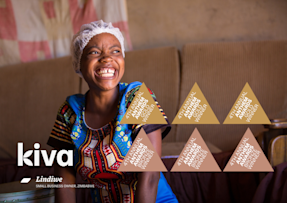The observance of Ramadan falls on the ninth month of the Muslim calendar and this year began on June 28 and went through July 28. Traditionally, Muslims fast during Ramadan to ‘purify’ their minds so they can better focus on self-reflection and prayer. This leads to a greater understanding of others and the month is known as a time for giving and increased acts of charity.
As the world marks Ramadan, we are taking the opportunity to shine a light on the tireless work of our partners in the Middle East, working hard to create opportunity and a brighter future for low-income and vulnerable populations.
The Middle East has some of the highest unemployment rates in the world, and microfinance plays a crucial role in the stable development of the region by providing access to jobs and education.
Kiva’s partners work in countries all over the Middle East, including areas of conflict, and their goals are often similar to those of Ramadan:
Both support an extended community
Communities fast and reflect during Ramadan together and community support is essential during this month. It is the perfect time to build bridges with neighbors and friends, regardless of religion.
Palestine for Credit & Development, or FATEN, builds bridges by traveling extensively to towns, villages and refugee camps surrounding its offices in order to expand financial access and ensure it reaches marginalized communities in even the most far reaching areas. Izdiharona in Iraq, works with individuals who are ostracized due to their gender, religion, ethnicity, location or nature of their business activity and helps integrate them back into a community.
Both believe in equal opportunity
While fasting during Ramadan, participants will experience similar pangs of hunger and thirst that are felt unwillingly by people all over the world. This feeling encourages individuals to make changes and work on behalf of the poor.
Similarly, Kiva’s partners work to create equal opportunities for those who suffer the most. In Yemen, a country whose economy has been impacted greatly from political instability, Al-Amal Microfinance Bank (AMB) provides microloans to the poorest communities, specifically those on government welfare, in an effort to boost local economies.
Al Majmoua, in Lebanon, creates opportunities for groups displaced by conflict by providing appropriate financial and non-financial resources regardless of their religion, nationality, gender or political affiliation. Helping others access the resources they need to succeed are important goals of both Ramadan and Kiva.
Both are part of a cycle
Although Ramadan takes place once a year, Muslims are encouraged to take the lessons from the month and apply them every day. Similarly, a loan at Kiva isn’t just applied once, but can be recycled to impact many borrowers in the future. Community support, greater empathy, and working with others are not only values of Ramadan and Kiva, but are universal ideas. To celebrate the generous nature of Ramadan, lend to a borrower in the Middle East, recognizing that talent is global but opportunity is not.
PREVIOUS ARTICLE
Exposure Photo Essay: Funded Globally, Crafted Locally →NEXT ARTICLE
Building Lasting Skills in Colombia with Interactuar →














